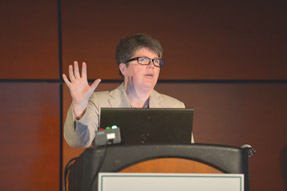July/August 2015

Prescribe opioids, but with caution
Use of opioids for chronic pain quadrupled in a 10-year span, despite scant evidence that they are effective for noncancer pain and ample evidence of harm. Learn more about how to prescribe them safely.
Know your kidney stones
Knowing what makes up a patient's kidney stones determines how an internist might treat the problem. But, one expert cautions, while 1 type of kidney stone is far more prevalent, there are 4 other kinds, and they may require subspecialty treatment.
Workflow adjustments can yield small practice satisfaction
Physicians considering joining an accountable care organization should take an active role from the beginning stages, first by developing benchmarks for effective practice, and then building strong relationships with subspecialists.
Need grows for antimicrobial stewardship
Internists looking for a career in a growth field could consider antimicrobial stewardship. One internist recounts the ups and downs of his chosen profession.
Oncologist optimistic about latest cancer treatments
Genomic targeted therapies and immune therapies are 2 areas that internists should know about, so they can refer their patients for such treatments, an expert says.
6 keys to managing the cirrhotic inpatient
An expert seeks to put his fellow physicians at ease about treating a patient population that can become quite sick and require a few clinical considerations to manage.
Preserving the clinical relationship in the age of digital health
The U.S. health care system is headed toward a profoundly digital future. Provider organizations around the country are adopting and updating their health information technology (HIT) infrastructures.
Make more time in your day, and spend it wisely
A mindfulness expert helps calm harried physicians with key ways to make more time in the day and then spend it on the things that really matter in life.
With the SGR gone, are ACP members all in?
ACP has been part of a major legislative victory in the repeal of the sustainable growth rate. The organization has embraced quality improvement and high-value care as the future of internal medicine, and it seeks the same commitment from its members.
How was ACP's 2015 Leadership Day different from all others?
Following the repeal of the sustainable growth rate, ACP seeks to secure its future through other legislative and regulatory goals, including physician payment reform, graduate medical education, and primary care workforce programs.
Internal Medicine Meeting 2015 breaks records
This issue wraps up coverage of the Internal Medicine Meeting 2015 from Boston.
Just say ‘no’ to virtual credit cards
Beware the latest trend that many payers are adopting, a kind of virtual credit card that actually incurs a fee to the practice of between 1% and 5%.
FDA approves heart failure drug, looks into antiseptic safety
This update covers a warning that sodium-glucose cotransporter-2 inhibitors can cause ketoacidosis, and approval of a drug that can reduce hospitalizations from worsening chronic heart failure.
1975-1984: The Cold War touches the globe and the College
ACP's seventh decade witnesses an increase in geopolitics and its impact on medicine as well as the role that other specialties would play in primary care.
MKSAP Quiz: 3-day history of dysuria
A 26-year-old man is admitted to the emergency department with a 3-day history of dysuria with yellow urethral discharge. Following a physical exam and a Gram stain of urethral discharge, what is the most appropriate treatment?.
